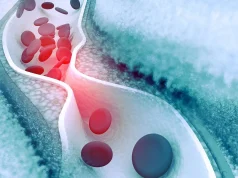Improved virologic response rates, decreased liver fibrosis progression, HCC incidence
FRIDAY, April 10, 2015 (HealthDay News) — For patients with hepatitis C virus (HCV), statin therapy is associated with improved virologic response rates, as well as decreased liver fibrosis progression and hepatocellular carcinoma (HCC) incidence, according to a study published online April 6 in Hepatology.
Adeel A. Butt, M.D., from the VA Pittsburgh Healthcare System, and colleagues examined the impact of adding statins to antiviral therapy upon sustained virologic response (SVR) rates, fibrosis progression, and HCC development among HCV infected persons. Data were collected from 7,248 eligible subjects from the Electronically Retrieved Cohort of HCV Infected Veterans, of whom 46 percent received statins.
The researchers observed significant correlations for statin use with attaining SVR (39.2 versus 33.3 percent; P < 0.01), decreased development of cirrhosis (17.3 versus 25.2 percent; P < 0.001), and decreased incident HCC (1.2 versus 2.6 percent; P < 0.01). After adjustment for other relevant clinical factors, statins remained significantly associated with increased odds of SVR (odds ratio, 1.44) and with lower risk of progression to cirrhosis (hazard ratio, 0.56) and incident HCC (hazard ratio, 0.51).
“Statin use was associated with improved virologic response rates to antiviral therapy and decreased progression of liver fibrosis and incidence of HCC among a large cohort of HCV positive Veterans,” the authors write.
Several authors disclosed financial ties to the pharmaceutical and biotechnology industries.
Copyright © 2015 HealthDay. All rights reserved.








